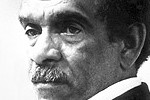By Dr. Selwyn R. Cudjoe
April 18, 2008
 In Omeros, Derek Walcott’s epic poem, Achille, one of the major protagonists, returns to Africa and is welcomed home by Ofolabe, his father. During that visit, Ofolabe learns that Achille changed his African name to a Caribbean name that has little meaning. Hurt by this name change, Afolabe retorts:
In Omeros, Derek Walcott’s epic poem, Achille, one of the major protagonists, returns to Africa and is welcomed home by Ofolabe, his father. During that visit, Ofolabe learns that Achille changed his African name to a Caribbean name that has little meaning. Hurt by this name change, Afolabe retorts:
“A name means something. The qualities desired in a son,/and even a girl-child; so even the shadows who called/you expected one virtue, since every name is a blessing,/ since I am remembering the hope I had for you as a child./ Unless the sound means nothing. Then you would be nothing./ Did they think you were nothing in that other kingdom?”
As we consider our existentialist dilemma—the murder rate has reached 119 for the year– it is important to ask who we are as a people and what bind us together as a nation. At the dawn of our nation’s journey into adulthood, Dr. Eric Williams, the father of the Nation, proclaimed: “There can be no Mother India for those who came from India. There can be no Mother Africa for those of African origin. There can be no Mother China even if one can agree as to which China is the mother; and there can be no Mother Syria and no Mother Lebanon. A nation, like an individual, can have only one Mother and a Mother cannot discriminate between her children.”
Since our advent into nationhood, we have been faced with the crucial question: what constitutes our Trinbagonianness?
Our social scientists have said we are a multicultural, multiracial and a multiethnic society and there is much truth in these designations. Some even say we are Trini to the bone. Such appellations are more descriptive than analytical. They do not tell us what it means to be Trini to the bone or, for that matter, what is the essence of our nation’s being.
Dr. Williams acknowledged that our country consists of several groups of people that were thrown together because of historical accidents. Yet, in defining us via a negation, he told us more about who we are not rather than who we are. In other words, our nationness cannot consist of a mere negation. Although he qualified his assertion by affirming that a nation could only have one mother, he left us with the task of giving a more comprehensive account of our national essence; that is, what that national motherhood should be. Another way of putting the question is to ask how do we assembly our historical antecedents to arrive at a definition of our uniqueness as a people.
We can divide our history into two essential moments: the nineteenth and the twentieth century. The first century can be seen as a moment of formation while the second century can be characterize as a process of national consolidation when we, as a people, began to claim this land as our own.
Modern Trinidad and Tobago began at the turn of the 20th century when there was much upheaval in the land; a time when we began to place our indigenous stamp on this land. In this accounting, I see Jose de Suze’s Little Folks’ Trinidad, published in 1901, as a foundational text of our nation. De Suze, a Port of Spain school master, decided he would educate Trinbagonians about their local geography and history. It was a necessary starting point in defining a Trinbagonian identity.
Naming one’s space constitutes an important moment of a nation’s beginning. Rather than saying who we are not or paying reverence to how our colonizers defined us, national self-identity consists in positive acts of retrieval and a long process of analyzing the pre-conditions of our existence. While Dr. Williams’s statement constitutes a necessary beginning, he charged subsequent generations with filling in the amorphous content of national identity.
Although the church, the family, the law and other such ideological apparatuses play crucial roles in constructing national identity, our schools have a unique part to play in the formation of national identity. They are the institutions that give concreteness to our Trinbagonianness; a task for which the University of Trinidad and Tobago has a special responsibility.
To be sure, this naming business is tenuous business. Walcott articulated an aspect our dilemma with skill furled dexterity when Afolabe said to Achille:
“No man loses his shadow except it is in the night,/ and even then his shadow is hidden, not lost. At the glow/of sunrise, he stands on his own name in that light./ When he walks down to the river with the other fishermen/his shadow stretches in the morning, and yawns, but you,/if you’re content with not knowing what our names mean,/ then I am not Afolabe, your father, and you look through/my body as the light looks through a leaf. I am not here/ or a shadow. And you, nameless son, are only the ghost/ of a name.”
Although my country may be lost in a haze, it is imperative that we see the light through our darkness. No one should call us out of our name nor should we feel marooned on islands that possess such richness, grandeur and talent. These islands are our home. We should name and re-possess them with love.

I’m curious, would these be defining moments for our indigenous people and how?
“We can divide our history into two essential moments: the nineteenth and the twentieth century. The first century can be seen as a moment of formation while the second century can be characterize as a process of national consolidation when we, as a people, began to claim this land as our own.”